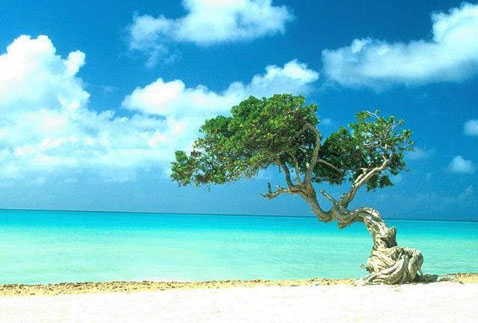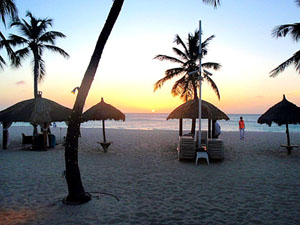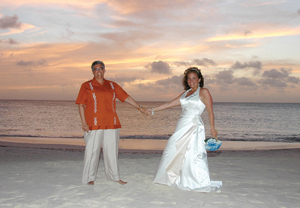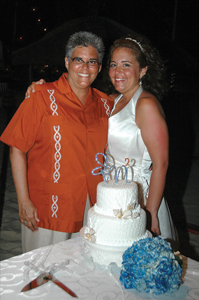 In Aruba, being gay is a nonissue, but saving the environment is
In Aruba, being gay is a nonissue, but saving the environment is

Twenty miles off the coast of Venezuela, amidst the sparkling, aqua blue waters of the Caribbean Sea, rests the intimate and extremely gay-friendly island of Aruba. Poised outside the Caribbean hurricane belt, the arid island of just 70 square miles, which, when combined with Curacao and Bonaire makes up the Dutch Leeward Islands, receives a mere maximum of 20 inches of rainfall annually. As a result, plants such as cactus are abundant, as is aloe vera, which is great for external and internal healing of the body. On the flip side, however, nearly every perishable item is imported. Translation: expensive! Sunshine nearly everyday, with an average year around temperature of 82 degrees makes for a great getaway—especially for Europeans coming from areas where the norm may be wet and gloomy.
As with most islands throughout the Caribbean, the Spanish, the French, the English and the Dutch (at one point or another) managed to fight off the Arawak, or Caribe Indians to steal, or shall we say, “inhabit” the land. With the Dutch being the final conquerors of Aruba, the colorful influence is duly noted throughout the many colorful buildings that are especially noted upon arrival to the island via cruise ship, whereby landing in the heart of the capital city—Oranjestad.
Although English is widely spoken in Aruba, Dutch is the official language. However, Papiamento—a largely Spanish-based Creole language also used on Curacao and Bonaire, is traditionally spoken throughout.
SLUMBER:
 |
| Photo: Courtesy of Bucati |
Standing side by side on 14 acres of sugary sand in the low-rise hotel area of the island (versus the very touristy high-rise area where the buildings eclipse the sun and everything else native to the island) are two Mediterranean-influenced buildings under the name (and ownership) of Bucuti and Tara Beach Resorts. Separating the two is the fact that Tara Resort is an all-suite building. Rated four stars each, they boast a modern design that incorporates rich woods and earthy tones with a splash of brightness here. Creature comforts such as flat-screen HD TVs, an iPod docking station and free wireless Internet are appreciated—though don’t forget it’s time to disconnect for awhile.
Most commendable in the current day and age of environmental friendliness, the owner of Bucuti and Tara Beach Resorts has created an entirely green atmosphere. Aerated water for the bathroom faucets and shower heads, low-flow toilets and dispensers for bath gel, shampoo and body lotion to greatly reduce the waste generated from individual-size containers (bonus: less packing for you), recycle cans allowing you to separate your paper, or glass/cans at the time of disposal and air conditioning that ceases to operate when an exterior door is ajar are sure to have an impact on the world in which we live.
“We reuse our waste water, use natural cleaning products such as vinegar and water, and citrus clean in place of heavy chemicals. We’ve even banned swim with the dolphin programs as animal cruelty,” says Ewald Biemans, owner of Bucuti & Tara Beach Resorts.
With 104 rooms on 14 acres of ocean front land, Bucuti and Tara Beach Resorts are intimate enough for a boutique-sized wedding and spacious enough to be private. Most couples opt for a beach setup—a specialty of Nashette Wouters, the resort’s certified professional wedding planner.

|
| Photos: Courtesy of Bucati |
Weddings, the renewal of vows and other celebrations of matrimony come in a rainbow of colors on an island where all are welcomed, although gay weddings are not legally recognized. In May, Bucuti demonstrated its support for marriage equality hosting its first gay wedding ceremony. The happy couple—Jude Medeiros and Jean-Marie Navetta, said, “I do” in front a group of family and dear friends. The Washington, D.C. area couple has been vacationing at Bucuti for the past five years. Each attests to always having felt at ease amongst the staff and other guests at the resort.
The year before, when Medeiros proposed on Bucuti’s beach with a shining Caribbean-blue diamond, word of their engagement quickly spread around the resort. That’s when Nashette (Bucuti and Tara Beach Resorts wedding coordinator) took action and sent the couple a gift to express a sincere desire for the wedding to be held there at the beachfront resort.
Jean-Maire says, “Bucuti has given us a place where we’ve always been ourselves and we were honored to be married there.”
“Jude and Jean-Marie have become part of the Bucuti family, and we were so happy they chose to exchange their wedding vows here,” says Bucuti Resort Owner Ewald Biemans
The resort’s website (www.bucuti.com) offers wedding and renewal ceremony packages from $515.
SEE & DO:
For some, it may be hard to steal away from a lazy day on the white sand outlining the blue-green Caribbean Sea. If you desire to experience motorized water sports such as jet skis, parasailing, tubing and more, head for the high-rise hotel side of the island. With the island being just 70 square miles, it’s really not that big of a deal to travel the distance.
Nature lovers should pay a visit to Arikok National Park (Arikokpark.com). Occupying one-fifth of the island, the more than 21 miles of dry habitat, or xeric land, is protected. More than 200 species of bird (including a tropical mocking bird) and all endemic species on the island—vertebrate, invertebrate and sub-species—including the cascabel, or Aruba island rattlesnake, which is at the top of the food chain with no predators—are at home at Arikok, as is the cododo or Aruban whiptail lizard, who is most active during the heat of the day. While you’re there, also look for the shoko is a subspecies of the burrowing owl as is the prikichi, which is similar to the parakeets on Bobnaire and Curacao.
With a bottle or two of cold water in tow, set aside some time to experience some of the hiking trails at Arikok. It’s best to avoid the saltwater beaches, which are not recommended for swimming due to the strong undertow.
If you’re anxious to spend a considerable amount of time out on the water for snorkeling and sailing and half at least half a day to spare, rent a sailboat. For small groups, consider the friendly and tranquil services of The Tranquillo, a family-operated sail-and-snorkel outfit operating on the islands since 1977.
DINE:
There are dozens of fun, gay-friendly restaurants to enjoy while in Aruba. At many, you’ll find a dish called keshi yena, which is the equivalent of Aruban soul food. The savory chicken casserole laden with cheese peppers, onions, raisins, cashew nuts and olives will grow on you after the first forkful. Sweet plantains are common, as in funchi—a sort of cornmeal mush, and pan bati, which is a crisp pan-cooked type of bread.
NIGHTLIFE:
Aruba is home to many gay residents, especially an influx of Latinos. So you’ll have no trouble feeling at home in most bars, casinos and restaurants—you’ll even come across a few drag shows if you time your honeymoon just right. But if you’re seeking an all-gay arena for a nightcap or some late-night dancing, head to Jimmy’s Place in Oranjestad.
OH, AND BY THE WAY:
You can totally drink the water here. Arubans have a desalination plant that converts salt water from the sea into drinking water. And with a reverse osmosis treatment added to it, delicious tap water is drinkable from practically every source on the island—even your hotel room.






























